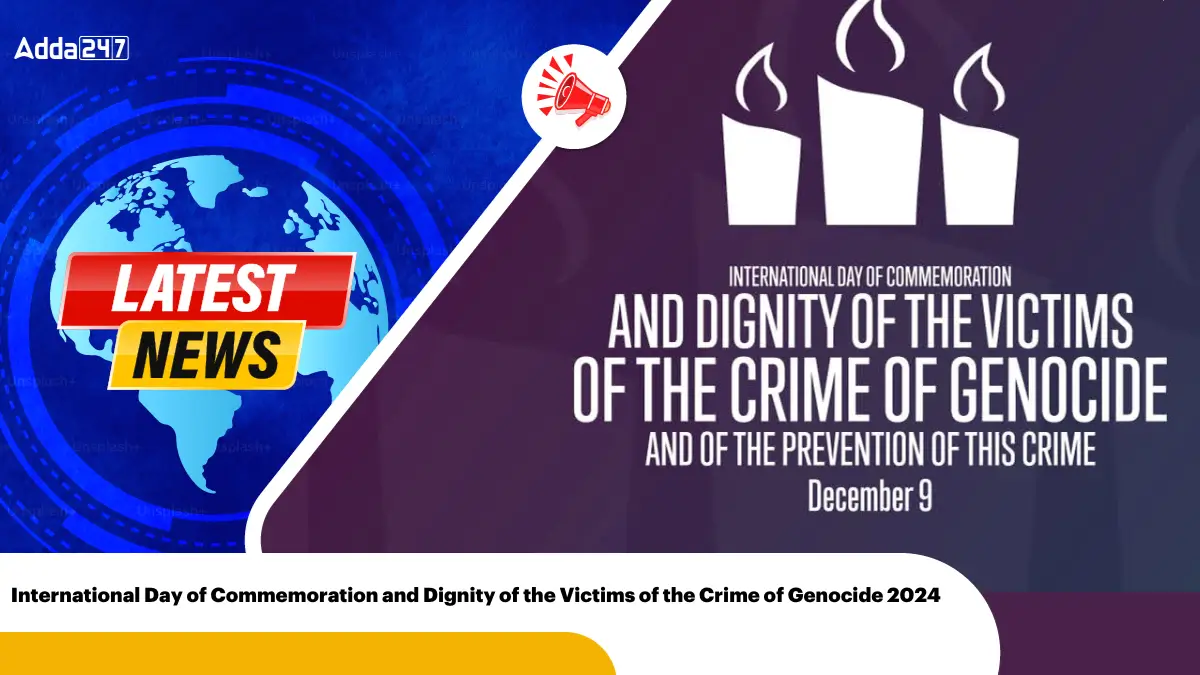Every year, December 9 is observed as the International Day of Commemoration and Dignity of the Victims of the Crime of Genocide and of the Prevention of This Crime. This day holds immense importance as it honors the victims of genocide and underscores the global commitment to prevent such atrocities. It also marks the adoption of the United Nations Genocide Convention on December 9, 1948—a cornerstone document in international law aimed at combating genocide.
Significance of December 9
Adoption of the Genocide Convention
On this day in 1948, the Convention on the Prevention and Punishment of the Crime of Genocide was adopted by the United Nations General Assembly. This historic treaty defined genocide as an international crime and set the groundwork for the international community’s commitment to prevent and punish acts of genocide.
Preceding the Universal Declaration of Human Rights
Interestingly, this significant milestone was achieved just a day before the Universal Declaration of Human Rights was adopted on December 10, 1948. Together, these two documents represent a global acknowledgment of the need to uphold human dignity and prevent atrocities.
History of the International Day
Introduction of Genocide Prevention Day
Since 2015, the United Nations has commemorated this day as Genocide Prevention Day. It serves as an opportunity to reflect on the lessons of past genocides and reaffirm the collective resolve to prevent such crimes in the future.
The Role of Raphael Lemkin
The term “genocide” was coined by Polish-Jewish lawyer Raphael Lemkin in 1942. Lemkin introduced this term in his book Axis Rule in Occupied Europe (1944) to describe the atrocities committed during World War II, particularly the Holocaust. His efforts led to the inclusion of genocide as a crime under international law.
Definition of Genocide Under International Law
The Genocide Convention outlines genocide as any of the following acts committed with intent to destroy, in whole or in part, a national, ethnic, racial, or religious group:
- Killing members of the group
- Causing serious bodily or mental harm to members of the group
- Deliberately inflicting conditions of life calculated to destroy the group
- Imposing measures intended to prevent births within the group
- Forcibly transferring children of the group to another group
This legal definition emphasizes the deliberate intent behind such acts, making genocide one of the most heinous crimes in human history.
The Impacts of Genocide
1. Mass Poverty
Genocide often leads to widespread poverty. As seen in Nazi Germany, Rwanda, and Bosnia, the destruction of livelihoods and forced displacement severely affect the economic well-being of affected communities.
2. Weakened Infrastructure
The collapse of infrastructure during genocide devastates communities. Basic amenities like roads, electricity, and water supply become luxuries, hampering economic growth and social stability.
3. Increased Crime Rates
In societies recovering from genocide, poverty often leads to a rise in crime. Limited resources for security and governance make it easier for crimes to occur, further destabilizing affected regions.
4. Disrupted Education
School systems often collapse during genocides. Displacement, destruction of schools, and loss of educators result in a generation of children missing out on education.
5. Economic Decline
The significant loss of life and disruption of communities result in a depleted workforce, hindering economic recovery.
6. Political Instability
Genocide often occurs under totalitarian regimes or unstable governments. After genocide, political instability can persist for decades, as seen in Rwanda and Bosnia.
7. Health Crises
Genocide leaves healthcare systems in shambles. In Rwanda, for example, sexual violence during the genocide led to a surge in HIV/AIDS cases, overwhelming the already fragile healthcare system.
8. Targeting of Minorities
Genocides often target minorities, as these groups are perceived as vulnerable or “different” within the larger society. This targeting deepens divisions within communities.
9. Long-Term Vulnerability
Even after genocide ends, its effects linger. Societies often experience emotional trauma, distrust, and poverty, making recovery an uphill battle.
10. Genocide Can Be Prevented
While genocide is a complex issue, it is preventable. By fostering respect, dignity, and humanity, individuals and governments can work together to build a world free from such atrocities.
Key Lessons and Preventive Measures
Learning from History
The horrors of the Holocaust, the Rwandan Genocide, and the Bosnian Genocide highlight the need for vigilance and international cooperation to prevent future atrocities.
Promoting Human Rights
A strong emphasis on human rights and equality is essential in combating the root causes of genocide. Discrimination, hate speech, and totalitarianism must be addressed at their roots.
Education and Awareness
Raising awareness about genocide and its consequences is crucial. Commemorating days like December 9 helps spread knowledge about the importance of prevention.
Global Collaboration
Countries must work together to uphold the principles of the Genocide Convention and ensure accountability for perpetrators of genocide.
Summary of the News: International Day of Commemoration and Dignity of the Victims of the Crime of Genocide
| Heading | Details |
|---|---|
| Why in News | December 9 is observed as the International Day of Commemoration and Dignity of the Victims of Genocide to honor victims and promote genocide prevention. |
| Significance | Marks the adoption of the 1948 UN Genocide Convention, which defined genocide as an international crime and committed nations to prevention and punishment. |
| History | Introduced in 2015 by the United Nations. The term “genocide” was coined by Raphael Lemkin in 1942 and first legally defined in the Genocide Convention. |
| Key Provisions of the Genocide Convention | Genocide includes: killing members of a group, causing serious harm, creating destructive conditions, preventing births, or forcibly transferring children. |
| Impacts of Genocide | – Mass Poverty: Destroys livelihoods. – Weakened Infrastructure: Disrupts roads, electricity, and services. – Increased Crime: Poverty leads to crime. – Disrupted Education: Schools and access to education collapse. – Economic Decline: Workforce depletion hinders recovery. – Political Instability: Leaves nations vulnerable for decades. – Health Crises: Overwhelms healthcare systems with diseases like HIV/AIDS. – Targeting of Minorities: Vulnerable groups face atrocities. |
| Preventive Measures | – Promote human rights and equality. – Strengthen international cooperation and accountability. – Spread awareness through education and events. |



 World Mangrove Day: Preserving Nature’s ...
World Mangrove Day: Preserving Nature’s ...
 Kargil Vijay Diwas 2025: A Salute to Val...
Kargil Vijay Diwas 2025: A Salute to Val...
 Income Tax Day (July 24): A Symbol of Fi...
Income Tax Day (July 24): A Symbol of Fi...

